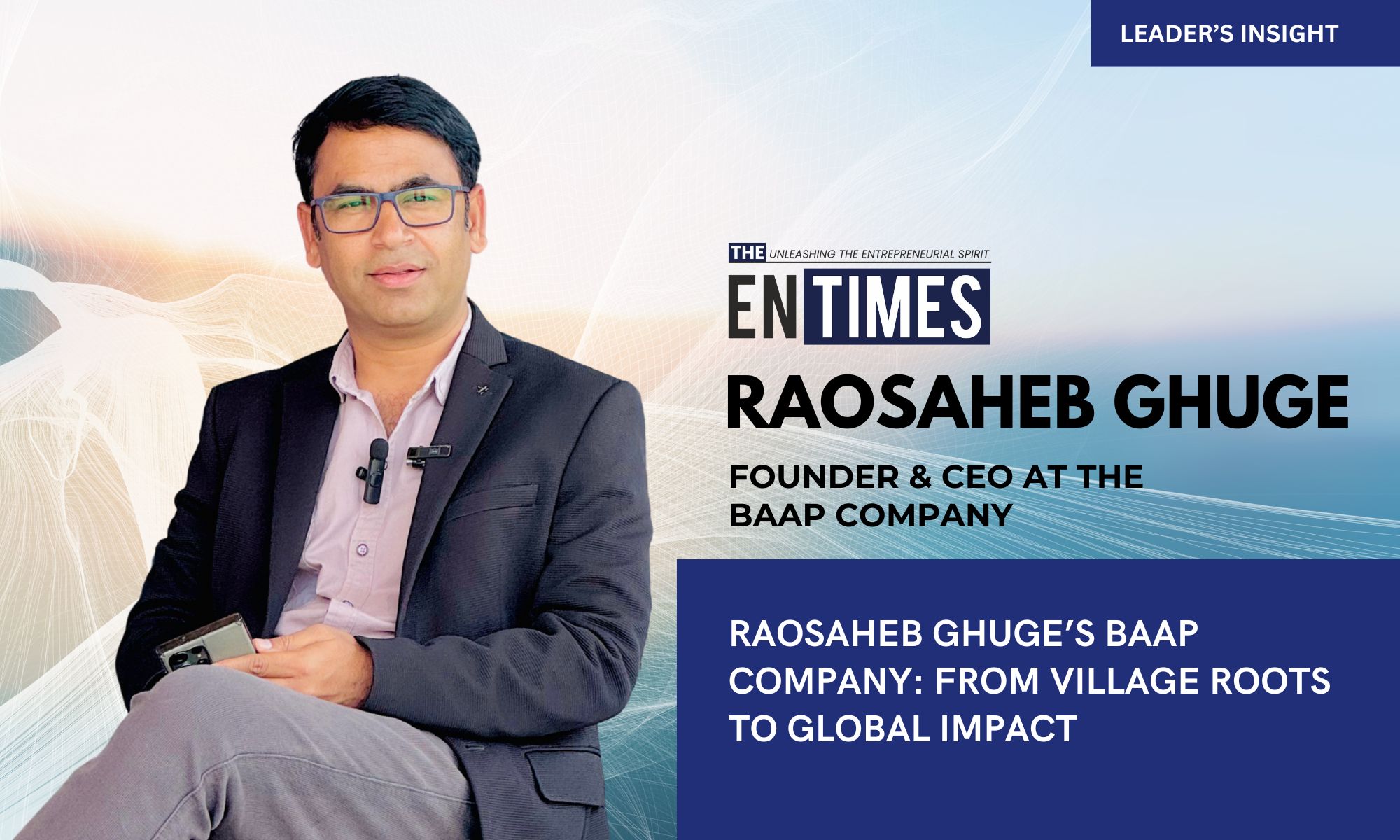In an era where tech startups thrive in bustling cities, one man dared to rewrite the rulebook. Raosaheb Ghuge, the founder of The Baap Company, turned his back on the glitzy lights of Mumbai and Pune to build a revolutionary tech venture in the quiet village of Paregaon Khurd, Ahmednagar. His story is one of vision, grit, and relentless belief in rural India’s untapped potential.
Dreaming Big in a Small Village
Raosaheb’s journey began in Paregaon Khurd, a place where access to resources was limited but dreams knew no bounds. After completing his early education, he moved to Mumbai to explore opportunities. He faced the usual rural-urban hurdles, inadequate exposure, limited mentorship, and the intense competition of city life. But Raosaheb wasn’t chasing personal success. What stayed with him was the struggle rural children faced. And he wanted to change that. That thought planted the seed for The Baap Company, a company built for and by rural talent.
COVID-19: A Challenge Turned Opportunity
The pandemic disrupted lives, but for Raosaheb, it opened a door. As remote work became mainstream, he saw a golden opportunity. He returned to Paregaon with a clear mission to create IT jobs for the children of farmers and villagers, right in their hometown.
Starting From Zero
Raosaheb wasn’t walking into a ready-made setup. There were no developers, no connectivity, and certainly no infrastructure. So he built it brick by brick.
● Internet? No fiber. So he personally supervised the installation of 30 km of fiber-optic cable.
● Water? ₹20 lakhs were spent annually on tankers until they created their own reservoir.
● Electricity? No industrial line. So, they relied on backups and alternative sources.
Despite the challenges, his efforts bore fruit. Today, The Baap Company has over 350 employees working on live international software projects, all from a village.
Talent Development at Its Core
Instead of recruiting skilled engineers, The Baap Company creates them. They take youth from Class 10 or 12, train them in tech for 6–8 months, and prepare them for real-world projects. This unconventional approach dismisses traditional hiring filters like degrees or high GPAs. Instead, it focuses on potential, curiosity, and commitment. The training covers frontend, backend, app development, testing, UI/UX, and even digital marketing. New recruits begin as interns and grow with peer learning, mentorship, and hands-on project experience.
A Company That Feels Like Home
The workplace culture is unlike the corporate world. Everyone contributes equally, from washing their own plates to planting trees and staying late for deadlines. The environment is built on equality, trust, and ownership. It’s a flat structure. No cubicles. No hierarchy. Just collaboration, respect, and belonging.
Tech with a Vision
The Baap Company isn’t lagging behind in innovation. It’s ahead.
● In 2022, they introduced mobile development using Flutter.
● In 2024, they rolled out generative AI training, preparing their team for the next wave of tech.
Now, they boast a 40+ member AI team working on chatbots, automation, and smart tools for international clients.
Building Confidence Through Communication
Recognizing that rural students often lack confidence in English, the company started a daily 1.5-hour spoken English program. This initiative has transformed shy teenagers into confident professionals who lead meetings, communicate effectively, and take ownership. They don’t just code; they lead with clarity, connect with purpose, and communicate with conviction.
A Campus That Breathes Nature
Set amidst greenery, the company’s office feels more like a retreat. Surrounded by trees, fresh air, and silence, it inspires calm, clarity, and creativity. People feel off if they miss a day. That’s
the kind of emotional connection this place cultivates. This serene setting helps reduce stress and increases focus, something city offices can rarely offer.
Principles Before Profits
Raosaheb’s time in the U.S. instilled deep-rooted values of ethics, punctuality, and self-respect. This is a space of purpose, no smoking, no drinking, not out of restriction but out of respect for the environment and for each other. He wants to build a legacy-driven business, much like the Tata Group, grounded in purpose and social good.
A Movement, Not Just a Business
The Baap Company is more than an IT firm. It’s part of a larger movement to decentralize India’s tech industry. Why should all jobs be in Bangalore or Hyderabad? Why not in every taluka and district? His vision is to bring opportunities to where people live, reducing migration, urban congestion, and social disparities.
Changing Lives at the Grassroots
The real measure of success? Transformed lives. They’ve seen sons of farmers earning ₹30,000–₹60,000 per month. They support their families and educate their siblings, all while staying rooted. It’s not just employment; it’s empowerment. And the ripple effects will last for generations.
To Future Entrepreneurs: Solve Real Problems
Raosaheb’s advice is clear: don’t chase unicorn labels. Instead, solve problems that matter. Dig deep, stay authentic, and build ventures that create meaningful impact.
What’s in a Name?
The name ‘Baap’ symbolizes the backbone of a silent, strong support system. And that’s what this company, and its people, represent. They’re creating not just jobs, but leaders, one village at a time.
Conclusion
The Baap Company is proving that location is no barrier when purpose drives the mission. With its heart in the soil and vision on the skyline, this company is a testament to what’s possible when we believe in people, invest in their growth, and build with intention. The journey of The Baap Company is more than a success story. It’s a blueprint for the future of inclusive, rural-first development in India. From Paregaon to the Global Stage, The Baap Company Is Proof That Purpose, Passion, and People Can Build a New India.



